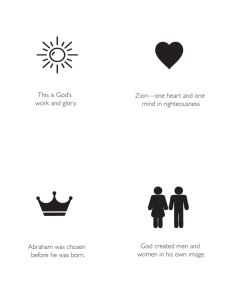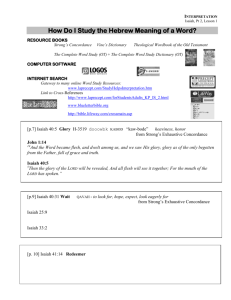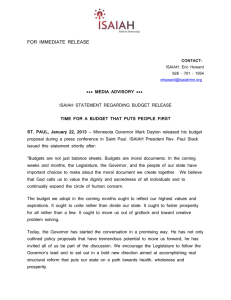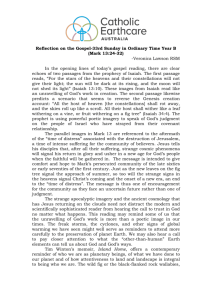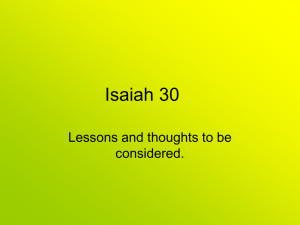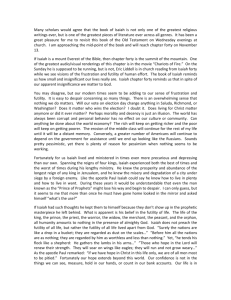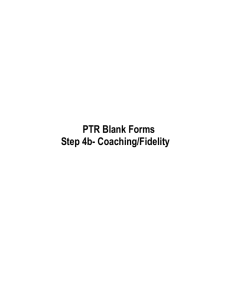Mormon/Urantia Book--Line upon Line. Precept upon precept.
advertisement
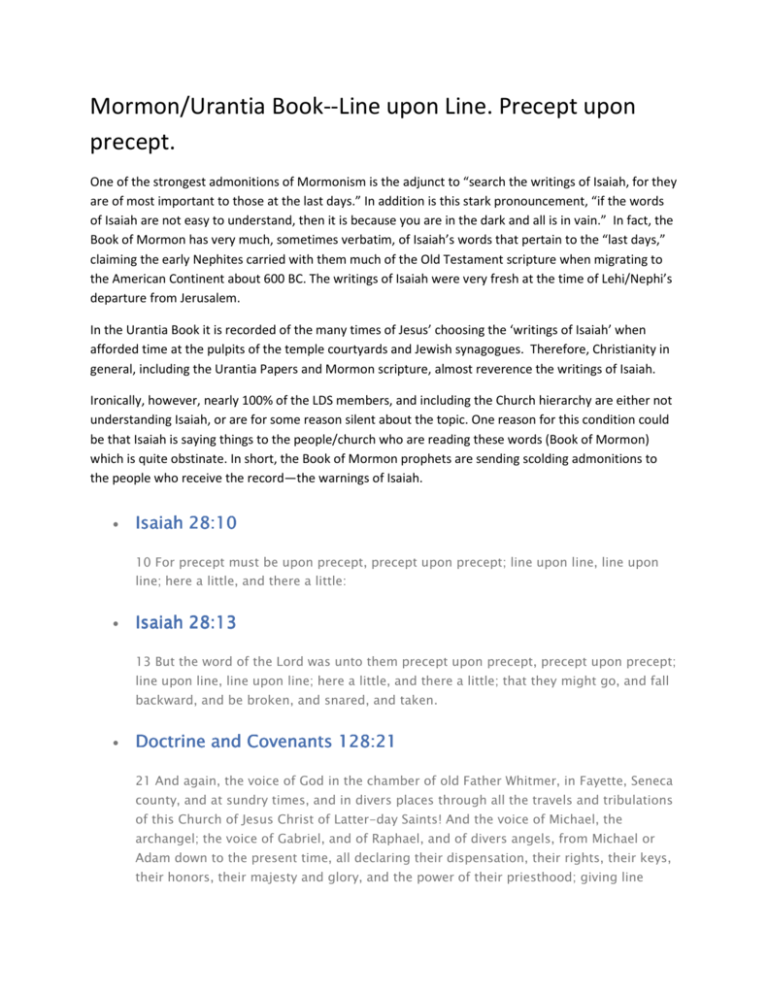
Mormon/Urantia Book--Line upon Line. Precept upon precept. One of the strongest admonitions of Mormonism is the adjunct to “search the writings of Isaiah, for they are of most important to those at the last days.” In addition is this stark pronouncement, “if the words of Isaiah are not easy to understand, then it is because you are in the dark and all is in vain.” In fact, the Book of Mormon has very much, sometimes verbatim, of Isaiah’s words that pertain to the “last days,” claiming the early Nephites carried with them much of the Old Testament scripture when migrating to the American Continent about 600 BC. The writings of Isaiah were very fresh at the time of Lehi/Nephi’s departure from Jerusalem. In the Urantia Book it is recorded of the many times of Jesus’ choosing the ‘writings of Isaiah’ when afforded time at the pulpits of the temple courtyards and Jewish synagogues. Therefore, Christianity in general, including the Urantia Papers and Mormon scripture, almost reverence the writings of Isaiah. Ironically, however, nearly 100% of the LDS members, and including the Church hierarchy are either not understanding Isaiah, or are for some reason silent about the topic. One reason for this condition could be that Isaiah is saying things to the people/church who are reading these words (Book of Mormon) which is quite obstinate. In short, the Book of Mormon prophets are sending scolding admonitions to the people who receive the record—the warnings of Isaiah. • Isaiah 28:10 10 For precept must be upon precept, precept upon precept; line upon line, line upon line; here a little, and there a little: • Isaiah 28:13 13 But the word of the Lord was unto them precept upon precept, precept upon precept; line upon line, line upon line; here a little, and there a little; that they might go, and fall backward, and be broken, and snared, and taken. • Doctrine and Covenants 128:21 21 And again, the voice of God in the chamber of old Father Whitmer, in Fayette, Seneca county, and at sundry times, and in divers places through all the travels and tribulations of this Church of Jesus Christ of Latter-day Saints! And the voice of Michael, the archangel; the voice of Gabriel, and of Raphael, and of divers angels, from Michael or Adam down to the present time, all declaring their dispensation, their rights, their keys, their honors, their majesty and glory, and the power of their priesthood; giving line upon line, precept upon precept; here a little, and there a little; giving us consolation by holding forth that which is to come, confirming our hope! • Doctrine and Covenants 98:12 12 For he will give unto the faithful line upon line, precept upon precept; and I will try you and prove you herewith. • 2 Nephi 28: 2929-31 • 29Wo be unto him that shall say: We have received the word of God, and we aneed bno more of the word of God, for we have enough! • 30For behold, thus saith the Lord God: I will give unto the children of men line upon line, precept upon aprecept, here a little and there a little; and blessed are those who hearken unto my precepts, and lend an ear unto my counsel, for they shall learn bwisdom; for unto him that creceiveth I will give dmore; and from them that shall say, We have enough, from them shall be taken away even that which they have. • 31Cursed is he that putteth his atrust in man, or maketh flesh his arm, or shall hearken unto the bprecepts of men, save their precepts shall be given by the power of the Holy Ghost. The Urantia Book has a very positive word to say regarding Isaiah. Jesus, in scolding the Pharisees for twisting the words of Israel’s prophets , uses Isaiah’s words as attributing to those who call themselves the “elders of Israel” in Jesus’ day. 153:3.3 Then one of the Jerusalem spies who had been observing Jesus and his apostles, said: “We notice that neither you nor your apostles wash your hands properly before you eat bread. You must well know that such a practice as eating with defiled and unwashed hands is a transgression of the law of the elders. Neither do you properly wash your drinking cups and eating vessels. Why is it that you show such disrespect for the traditions of the fathers and the laws of our elders?” And when Jesus heard him speak, he answered: “Why is it that you transgress the commandments of God by the laws of your tradition? The commandment says, ‘Honor your father and your mother,’ and directs that you share with them your substance if necessary; but you enact a law of tradition which permits undutiful children to say that the money wherewith the parents might have been assisted has been ‘given to God.’ The law of the elders thus relieves such crafty children of their responsibility, notwithstanding that the children subsequently use all such monies for their own comfort. Why is it that you in this way make void the commandment by your own tradition? Well did Isaiah prophesy of you hypocrites, saying: ‘This people honors me with their lips, but their heart is far from me. In vain do they worship me, teaching as their doctrines the precepts of men.’ There were, according to the Urantia Book, ‘two’ Isaiah’s. Between “Isaiah the first” and “Isaiah the second” were three of the Old Testament’s renown prophets: Micah, Obadiah and “Jeremiah the fearless.” Isaiah the second’s writings were so profound that in the centuries following, when the scribes of Judah selected which prophetic writings to canonize, they simply grouped both Isaiah’s together as one Isaiah. Referring to “Isaiah the second,” it is recorded in the Urantia Papers… And this young preacher left on record his teachings, which the hostile and unforgiving priests sought to divorce from all association with him, although sheer respect for their beauty and grandeur led to their incorporation among the writings of the earlier Isaiah. And thus may be found the writings of this second Isaiah in the book of that name, embracing chapters forty to fifty-five inclusive. 97:7.5 No prophet or religious teacher from Machiventa to the time of Jesus attained the high concept of God that Isaiah the second proclaimed during these days of the captivity. It was no small, anthropomorphic, man-made God that this spiritual leader proclaimed. "Behold he takes up the isles as a very little thing." "And as the heavens are higher than the earth, so are my ways higher than your ways and my thoughts higher than your thoughts." (UB Paper 97)
